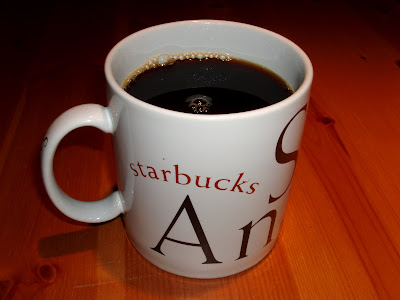
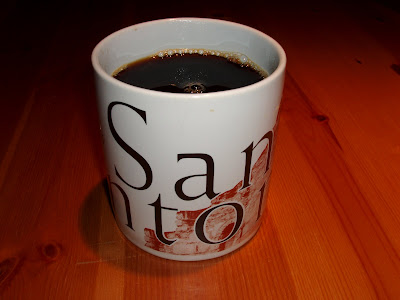
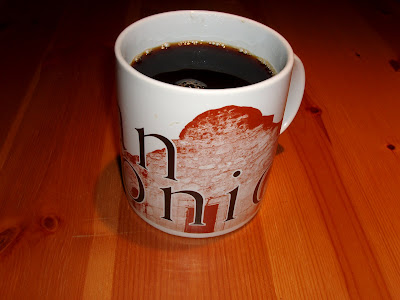
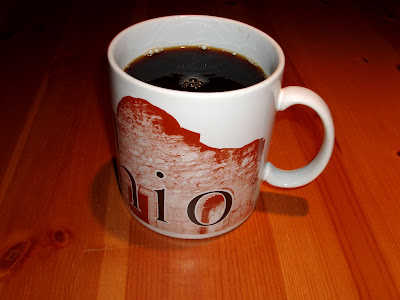 Coffee: Colombian, too strong, ground Thursday night as two packets to get Linden through the weekend in my planned absence. Plans change, and mine did.Mug: Giant Starbucks' latte mug from their location on the River Walk in San Antonio. I think this thing holds about 48 ounces of coffee. It's huge.Note: Today is the last day of Texas History Month. No matter how you spin it, Texas history revolves around San Antonio, the Mother City of Texas. San Antonio SHOULD have been the capitol of Texas, but was too vulnerable to capture by Mexican forces during the fragile years of the Republic. The home of the Alamo and Pearl Beer (the latter now gone). I love all of the major cities in Texas: Dallas, Fort Worth, Austin (for other reasons than most might think), Houston, El Paso, Galveston, Lubbock, and Amarillo. But my love for San Antonio runs deeper than my love for the others, deeper perhaps than even my love for my home city of Dallas.Austin is a connecting joint between Dallas and San Antonio, Houston is an extremity.
Coffee: Colombian, too strong, ground Thursday night as two packets to get Linden through the weekend in my planned absence. Plans change, and mine did.Mug: Giant Starbucks' latte mug from their location on the River Walk in San Antonio. I think this thing holds about 48 ounces of coffee. It's huge.Note: Today is the last day of Texas History Month. No matter how you spin it, Texas history revolves around San Antonio, the Mother City of Texas. San Antonio SHOULD have been the capitol of Texas, but was too vulnerable to capture by Mexican forces during the fragile years of the Republic. The home of the Alamo and Pearl Beer (the latter now gone). I love all of the major cities in Texas: Dallas, Fort Worth, Austin (for other reasons than most might think), Houston, El Paso, Galveston, Lubbock, and Amarillo. But my love for San Antonio runs deeper than my love for the others, deeper perhaps than even my love for my home city of Dallas.Austin is a connecting joint between Dallas and San Antonio, Houston is an extremity.
Post Script: There will be one more Texas History Coffee Mug post, but not during Texas History Month. Come back in a few weeks.
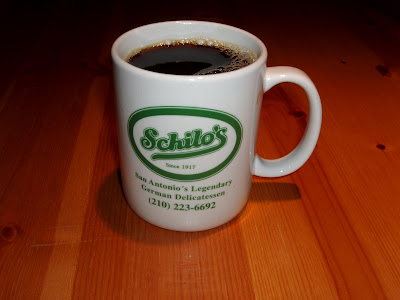 Coffee: Juan Valdez's preference.
Coffee: Juan Valdez's preference.
Mug: Got this at Schilo's Deli in San Antonio (right above the RiverWalk, and relatively tourist-free). The Alamo, the Menger Hotel, and Schilo's are the reasons I still go to San Antonio. I used to go for the Pearl Brewery, but General Brewing Corporation (ne: Pabst) put a stop to that. Schilo's is a great place for breakfast and lunch, but dinner is only served on Friday and Saturday nights. Used to see Henry Cisneros there for breakfast (it was one of his getaway offices), maybe he still goes there, I don't know. Rustic.
My only real complaint about the mug (a Chinese product) is that the glaze is too shiny, almost like a clearcoat (which it probably is: a clear glaze over ceramic base).
BTW: 1917 was a brave time to open a German deli. But, German was San Antonio's third (or FIRST) language back then.
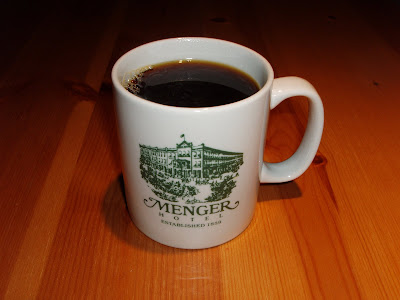 Mug: Another souvenir mug from San Antonio. Chinese made, generic mug. No complaints, but no raves either. Basic, functional design with the preferred 3-finger handle shape.What makes this mug special (to me) is its source: The Menger Hotel. The Menger is on Alamo Square in San Antonio, and was opened in the 1850's. It has quite a colorful history.
Mug: Another souvenir mug from San Antonio. Chinese made, generic mug. No complaints, but no raves either. Basic, functional design with the preferred 3-finger handle shape.What makes this mug special (to me) is its source: The Menger Hotel. The Menger is on Alamo Square in San Antonio, and was opened in the 1850's. It has quite a colorful history.- One of Texas' first commercial breweries operated there.
- General Robert E. Lee lived there when he commanded the U.S. Army garrison in San Antonio. He was there when Texas seceded from the Union, and a mob almost lynched him as they demanded the Union Army leave San Antonio. He left Texas, later to join the Confederacy and lead the Army of Northern Virginia (he was far more commited to Virginia than the Confederancy... had Virginia stayed in the Union, Lee would have led the Federals against the Rebels).
- Teddy Roosevelt lived there while he recruited his "Rough Riders" in the lobby bar, and trained them nearby at what later became Brackenridge Park.
- The Battle of the Alamo was fought on this site. The wall that Santa Anna's forces overwhelmed on their four-point assault was the picket wall that would have been next to the Menger's eventual location.
I love to stay there, usually in the old wing that dates back to the late 19th century, but also in the "modern motor court" wing that was built in the booming 1950's-60's. All true Texans love the Menger.Coffee: Still with the Colombian. Made it too strong this morning. Too strong, but still good. Full bodied? Full body slam!
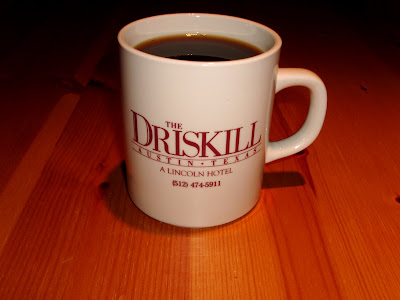 Mug: Chinese made restaurant mug. So average as to be unpleasant, this mug has nothing to recommend it, save for where it came from.Coffee: The Colombian.Note: Texas' major cities all have (or had) signature hotels from the "golden age of hotels" – institutions that embody the spirit of their host communities. Dallas has the Adolphus, San Antonio the Menger (and the St. Anthony), Houston had the Rice (and the Grand), Fort Worth the Worthington, and El Paso the Plaza.Austin's signature hotel was the Driskill on 6th Street at Congress. It was established in the mid-late 19th century. It was host to formal balls, high society teas, and lobbyists in town shopping for politicians at the Texas Capitol, conveniently located just a few blocks away. As such, it was also the get-away place for state elected officials to carry on their extra-marital adventures, whether lobbyist provided or naturally procured. The list of names of famous Texas politicians who took comfort in the Driskill is a long one.
Mug: Chinese made restaurant mug. So average as to be unpleasant, this mug has nothing to recommend it, save for where it came from.Coffee: The Colombian.Note: Texas' major cities all have (or had) signature hotels from the "golden age of hotels" – institutions that embody the spirit of their host communities. Dallas has the Adolphus, San Antonio the Menger (and the St. Anthony), Houston had the Rice (and the Grand), Fort Worth the Worthington, and El Paso the Plaza.Austin's signature hotel was the Driskill on 6th Street at Congress. It was established in the mid-late 19th century. It was host to formal balls, high society teas, and lobbyists in town shopping for politicians at the Texas Capitol, conveniently located just a few blocks away. As such, it was also the get-away place for state elected officials to carry on their extra-marital adventures, whether lobbyist provided or naturally procured. The list of names of famous Texas politicians who took comfort in the Driskill is a long one.
Texas politicians: Law by day, Grace by night (or possibly Susan, or even Jonathan).
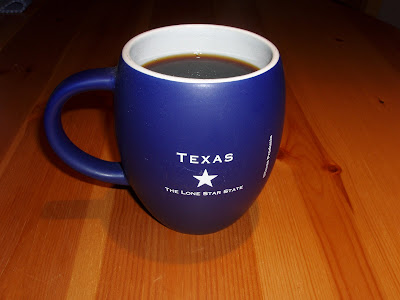
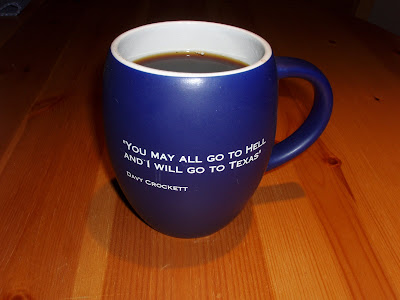 Mug: The companion mug to the "Remember the Alamo/Victory or Death" mug. The white star on the blue field mimicks the first Texas official flag. The Crockett quote is everyone's favorite.Coffee: Revelation 7:14Note: The company that makes this mug (and other Texanaista items) is based in College Station. Aggies get a little nervous talking about "Texas" all the time, for fear it will be confused with The University of Texas at Austin. By way of protest (and niche marketing), this company also makes a maroon version of this mug, with the Crockett saying slightly modified; "You may all go to hell, and I will go to Texas A&M."
Mug: The companion mug to the "Remember the Alamo/Victory or Death" mug. The white star on the blue field mimicks the first Texas official flag. The Crockett quote is everyone's favorite.Coffee: Revelation 7:14Note: The company that makes this mug (and other Texanaista items) is based in College Station. Aggies get a little nervous talking about "Texas" all the time, for fear it will be confused with The University of Texas at Austin. By way of protest (and niche marketing), this company also makes a maroon version of this mug, with the Crockett saying slightly modified; "You may all go to hell, and I will go to Texas A&M."
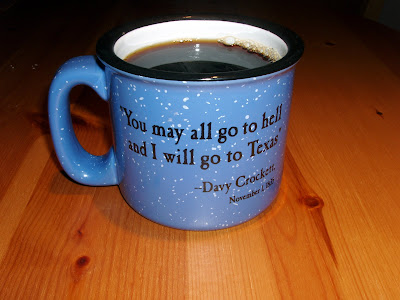 Mug: Thick ceramic mug made in China. VERY thick. It's a latte sized mug that might make a good soup mug. Its design inspiration is the enameled steel camp mug that was guaranteed to blister your lips if the coffee was hot. NO such problems with this design.
Mug: Thick ceramic mug made in China. VERY thick. It's a latte sized mug that might make a good soup mug. Its design inspiration is the enameled steel camp mug that was guaranteed to blister your lips if the coffee was hot. NO such problems with this design.
Coffee: The Colombian of comfortable habit, fresh ground this dark-morning in the burr grinder, drip brewed. Good stuff.Note: This mug features Congressman David Crockett's parting words to the citizens of Tennessee after his defeat for re-election to the U.S. Congress. His opponent had a wooden leg, and Crockett's quote more fully reads, "Since you have chosen to elect a man with a timber toe to succeed me, you may all go to hell and I will go to Texas." I purchased this mug at the Bob Bullock Museum of Texas History in Austin during their special Davy Crockett Exhibition. I highly recommend going to the Bullock Museum when you are in Austin, if for no other reason than to see the neon marquee from the old Texas Theater in Sherman, Texas hanging inside the atrium. I worked at the Texas as a projectionist when I was just starting college in 1969, and I know that marquee quite well.
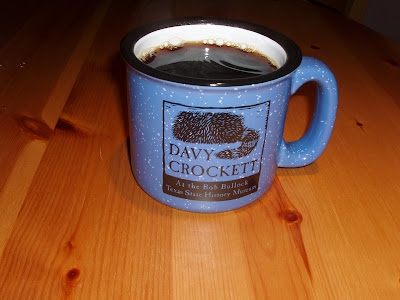
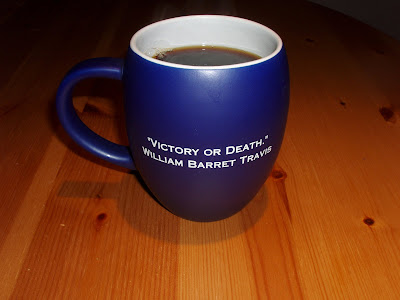
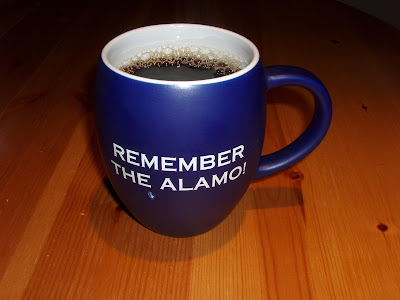 Mug: Cobalt blue "bistro" mug from a purveyor of Texana collectibles. Nice satin finish to the exterior glaze, nice stain-resistant gloss white inside. A very handsome, but slightly awkward handling mug. Too big? Handle shape? Narrow base? Regardless of its mechanical imperfection, this is one of my favorites. It's beautifully designed, with a great concept: the two sides bookcase the slogans of the beginning and the end of the Texas Revolution. Coffee: Colombian beans from Central Market. No adventure this morning, just comfort. Notes: Notice the little imperfection dimple underneath "Remember the Alamo!". I bought this on the clearance/damaged goods shelf at Waterloo Records in Austin. It's a cosmetic (but real) divot in the mug (air bubble in the ceramic). Looks like a little bullet hole. "Victory or Death!" sums up quite nicely why I am an Evangelical. We can either share in the victory of Jesus Christ, or we can suffer death. It's not our victory, but it is our death. And Jesus won his victory "so that all who believe in him will not die, but live for eternity." Evangelism simplified. Finally, a little dig. I bought this mug at Waterloo Records in Austin. Waterloo was the name of the city that became Austin a few years after the War of Independence. It was the idea of land developers who were trying to get the capitol of Texas moved to their city by renaming it after Stephen F. Austin (it should be noted that folks in the city of Harrisburg did the same thing by renaming their city after Sam Houston). The City of Austin (Waterloo) had no more connection to the Texas Revolution than did the city of Dallas (Bryan's Trading Post). Neither existed at the time of the Revolution, either by the name we know them by today, or by their earlier names. Both cities came into being during the years of the Republic.
Mug: Cobalt blue "bistro" mug from a purveyor of Texana collectibles. Nice satin finish to the exterior glaze, nice stain-resistant gloss white inside. A very handsome, but slightly awkward handling mug. Too big? Handle shape? Narrow base? Regardless of its mechanical imperfection, this is one of my favorites. It's beautifully designed, with a great concept: the two sides bookcase the slogans of the beginning and the end of the Texas Revolution. Coffee: Colombian beans from Central Market. No adventure this morning, just comfort. Notes: Notice the little imperfection dimple underneath "Remember the Alamo!". I bought this on the clearance/damaged goods shelf at Waterloo Records in Austin. It's a cosmetic (but real) divot in the mug (air bubble in the ceramic). Looks like a little bullet hole. "Victory or Death!" sums up quite nicely why I am an Evangelical. We can either share in the victory of Jesus Christ, or we can suffer death. It's not our victory, but it is our death. And Jesus won his victory "so that all who believe in him will not die, but live for eternity." Evangelism simplified. Finally, a little dig. I bought this mug at Waterloo Records in Austin. Waterloo was the name of the city that became Austin a few years after the War of Independence. It was the idea of land developers who were trying to get the capitol of Texas moved to their city by renaming it after Stephen F. Austin (it should be noted that folks in the city of Harrisburg did the same thing by renaming their city after Sam Houston). The City of Austin (Waterloo) had no more connection to the Texas Revolution than did the city of Dallas (Bryan's Trading Post). Neither existed at the time of the Revolution, either by the name we know them by today, or by their earlier names. Both cities came into being during the years of the Republic.
Austinites dislike being reminded of this.
 Mug: Another Chinese generic, ad-specialties mug. Good basic design, but lacking in some key tactile areas (body thickness and weight). This mug was part of the promotional campaign for the original "- God" billboards that were placed around the country several years ago. They were a wonderful series, and the person behind the project never revealed his/her identity. This particular mug was a gift to a Dallas City Councilmember. At a meeting, I saw it on her shelf and mentioned my approval. She gave it to me.Coffee: The Colombian base from Central Market.Notes: "Wait a minute," you perhaps say. "Isn't this Texas History Coffee Mug Month? What does this have to do with Texas History?" I'll tell you.The Texas Revolution was the last Western, and only American, Religious War. It's overlooked by the text books on all sides, which nowadays prefer to make the the Texas Revolution a war about slavery (it has that element, but not quite the way it's being spun).From the time of the Spanish Colonial Period up through Mexico's Independence, immigrants to Mexico had to convert to Roman Catholicism. All of Austin's "Old 300" did that. But with the advent of more immigrants coming from the Scottish midlands (the Great Celtic Wave that swept North America in the early 18th Century), came Presbyterians and Methodists and Baptists unwilling to renounce Jesus for the Pope. These were the same peoples who pushed the United States off the Atlantic Seaboard out past the Appalacians and onto the Great Plains. These were the first people who were able to stand against the Apache and the Commanche. Fighting was in their blood, and fighting for God and Land (not "country") was a job they were eager for.
Mug: Another Chinese generic, ad-specialties mug. Good basic design, but lacking in some key tactile areas (body thickness and weight). This mug was part of the promotional campaign for the original "- God" billboards that were placed around the country several years ago. They were a wonderful series, and the person behind the project never revealed his/her identity. This particular mug was a gift to a Dallas City Councilmember. At a meeting, I saw it on her shelf and mentioned my approval. She gave it to me.Coffee: The Colombian base from Central Market.Notes: "Wait a minute," you perhaps say. "Isn't this Texas History Coffee Mug Month? What does this have to do with Texas History?" I'll tell you.The Texas Revolution was the last Western, and only American, Religious War. It's overlooked by the text books on all sides, which nowadays prefer to make the the Texas Revolution a war about slavery (it has that element, but not quite the way it's being spun).From the time of the Spanish Colonial Period up through Mexico's Independence, immigrants to Mexico had to convert to Roman Catholicism. All of Austin's "Old 300" did that. But with the advent of more immigrants coming from the Scottish midlands (the Great Celtic Wave that swept North America in the early 18th Century), came Presbyterians and Methodists and Baptists unwilling to renounce Jesus for the Pope. These were the same peoples who pushed the United States off the Atlantic Seaboard out past the Appalacians and onto the Great Plains. These were the first people who were able to stand against the Apache and the Commanche. Fighting was in their blood, and fighting for God and Land (not "country") was a job they were eager for.
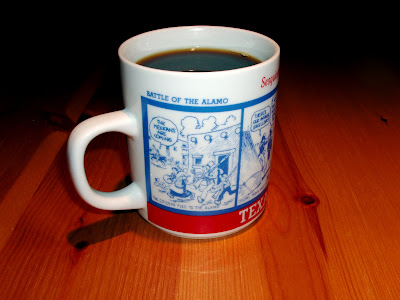
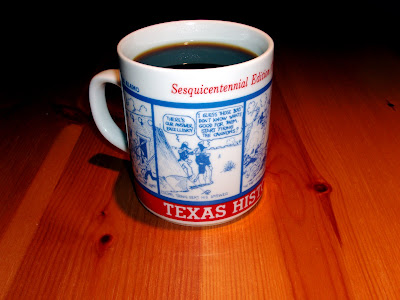
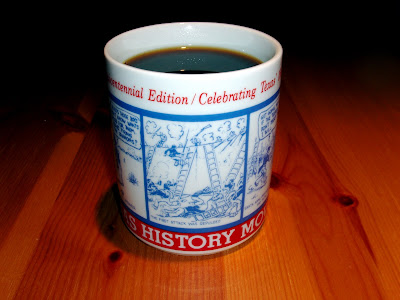
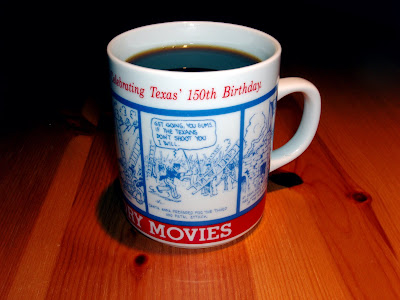
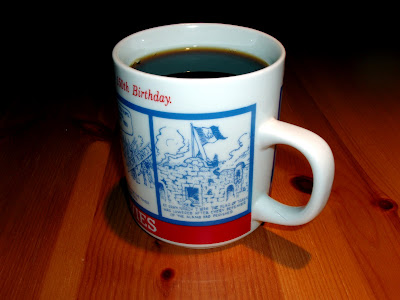 Mug: The third in the series of four Texas Sesquicentennial Mugs based upon Texas History Movies. The date listed on the mug for the Alamo's Fall is incorrect. March 6th is the day. See comments on the mugs in previous posts below.Coffee: Sumatra Classic Mandheling, home roasted. "Low-toned, caramel-chocolate roast taste, fruity-earthy hints, bittersweet finish, heavy body." That's what the merchant's description says. Who am I to argue?Notes: This morning one hundred and seventy one years ago, as I type this, the final assault on the Alamo was underway. 186 Texians vs. upwards of 5,000 Mexican troops. All of the defenders of the Alamo died, save Susanna Dickinson, her daughter, and their house servant (slave). Between 1,000 and 1,500 Mexican troops were casualties as well. Current revisionist history has the number of Mexican troops considerably smaller (both in total numbers and in casualties), and has David Crockett and some of his fellow Tennesseans surrendering and begging for their lives (totally out of character). This is all based on a single document, a diary of a Mexican officer that is of disputed authenticity. It is accepted because it tells a story the revisionists like. At the rate revisionist history is progressing, in a few more years we'll be echoing what the Mexican schools teach about the Alamo; that the Mexican Army was outnumbered by the defenders of the Alamo, who were an invasion force from the United States. That account is totally unsubstantiated by anything except General Antonio Lopez de Santa Anna's own memoirs. Shame on those who would propagate such lies.
Mug: The third in the series of four Texas Sesquicentennial Mugs based upon Texas History Movies. The date listed on the mug for the Alamo's Fall is incorrect. March 6th is the day. See comments on the mugs in previous posts below.Coffee: Sumatra Classic Mandheling, home roasted. "Low-toned, caramel-chocolate roast taste, fruity-earthy hints, bittersweet finish, heavy body." That's what the merchant's description says. Who am I to argue?Notes: This morning one hundred and seventy one years ago, as I type this, the final assault on the Alamo was underway. 186 Texians vs. upwards of 5,000 Mexican troops. All of the defenders of the Alamo died, save Susanna Dickinson, her daughter, and their house servant (slave). Between 1,000 and 1,500 Mexican troops were casualties as well. Current revisionist history has the number of Mexican troops considerably smaller (both in total numbers and in casualties), and has David Crockett and some of his fellow Tennesseans surrendering and begging for their lives (totally out of character). This is all based on a single document, a diary of a Mexican officer that is of disputed authenticity. It is accepted because it tells a story the revisionists like. At the rate revisionist history is progressing, in a few more years we'll be echoing what the Mexican schools teach about the Alamo; that the Mexican Army was outnumbered by the defenders of the Alamo, who were an invasion force from the United States. That account is totally unsubstantiated by anything except General Antonio Lopez de Santa Anna's own memoirs. Shame on those who would propagate such lies.
Remember the Alamo. Remember Goliad.
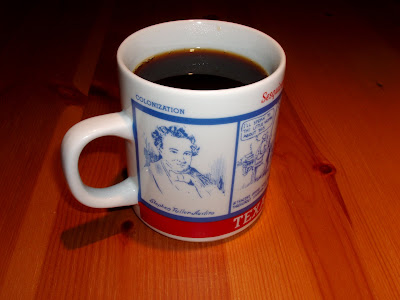 Mug: Second in the series of Texas Sesquicentennial MugsCoffee: Colombian city roastNote: The story of Stephen F. Austin and the "Old Three Hundred" is featured on today's mug. March 2nd, 1836 was the day the Republic of Texas declared its independence from Mexico.And of course, it's also the day (in 1986, the sequicentennial year) that I declared my eternal inter-dependence to Linden Baker Summer.
Mug: Second in the series of Texas Sesquicentennial MugsCoffee: Colombian city roastNote: The story of Stephen F. Austin and the "Old Three Hundred" is featured on today's mug. March 2nd, 1836 was the day the Republic of Texas declared its independence from Mexico.And of course, it's also the day (in 1986, the sequicentennial year) that I declared my eternal inter-dependence to Linden Baker Summer.
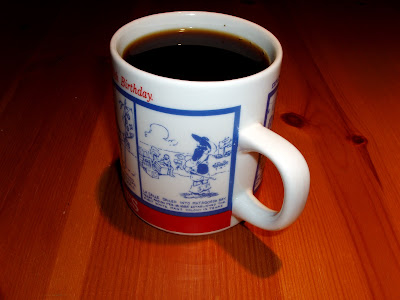 Mug: Generic Chinese-made ceramic mug. Decent shape, both vessel and handle. Kinda' cheap, which is rather typical for a promotional mug (suitable for visitor gifting by a church).Coffee: Colombian, city roast.
Mug: Generic Chinese-made ceramic mug. Decent shape, both vessel and handle. Kinda' cheap, which is rather typical for a promotional mug (suitable for visitor gifting by a church).Coffee: Colombian, city roast.
Notes: March is Texas History Month. I will be featuring mugs that reflect this over the next four weeks. This mug is from a series that was done to commemorate the Texas Sesquicentennial in 1986. The mug's rather basic design was actually done by my deceased next-door neighbor, Jim Grant (who also designed the Chili's logo for Brinker).There were several mugs (or at least four) in the series. I have five mugs, but one is a duplicate. I also have a mock-up proof that I got at a garage sale Jim had a number of years ago. The design incorporates panels from the legendary Texas History Movies cartoon series that ran in newspapers back during the Texas Centennial Celebration (1936). The newspaper strip was reproduced as a booklet by the Magnolia Oil Company (later called Mobil Oil), and given to fifth graders in all Texas elementary schools up through the mid sixties. They were fascinating, if not terribly polite... and certainly not "politically correct" by today's standards (or by any standard of cultural fairness and sensitivity). But they were a great way to teach Texas history.Today's mug shows the early Spanish and French explorers of Texas: Cabeza de Vaca, Coronado, and LaSalle. More to come.